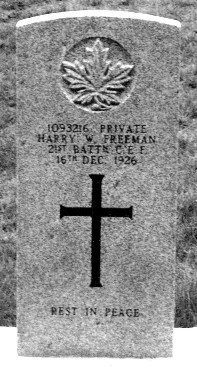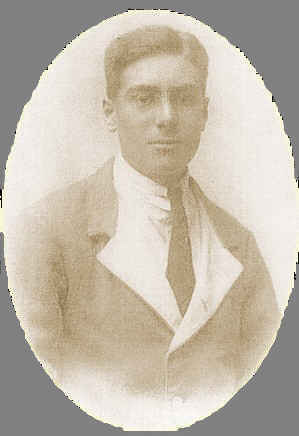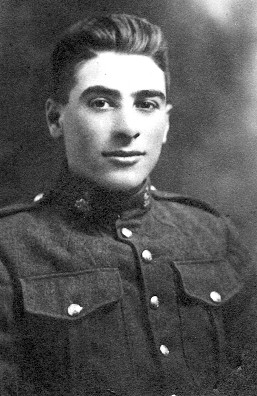|
Born in London, England, Henry (Harry) Freeman emigrated to
Canada with his family in 1907, settling in Deseronto Ontario before moving on to
Tweed, Ontario.
Harry had an older brother Jim who enlisted in the Canadian Expiditionary Force, and Harry
was eager to enlist, so he went to the recruiting office in Tweed. Harry had a little
problem though, he was just 17 years old, so when he talked to the recruiting officer he
told him that he was 17 and if they wouldn't take him he would just go somewhere to
enlist. The recruiting officer wrote on his Enlistment sheet that Harry appeared to be 18
years old. So Harry became a member of the 254th Battalion on January 5th 1917. He was
anxious to follow his brother Private Jim Freeman in joining the forces going to France.
Harry was assigned to the 254th Battalion, but while in France was transferred to the 21st
Battalion on September 2nd, 1917. Family stories, particularly those told by Harry's
younger brother Bert, who at 96 years of age, recounted that Harry was a sniper during the
war. According to him, Harry was an excellent shot with a rifle and he would
often take the sights off of a rifle and he could still hit a bird in a tree with no
problem. Bert was 97 years old when he died in 2001.
Harry fought on the front lines from September, 1917 to August 1918. His war ended on
August 8th, 1918 during the 21st Battalion's attack on Amiens. Harry was gassed, as well
as hit by shrapnel from a German shell causing wounds to both feet and legs. He was
transferred to a battlefield hospital at Rouen, where several toes had to be amputated and
shrapnel removed.
His older brother Jim was also wounded in that battle.
Jim served as a machine gunner with the 4th Canadian machine gun corps. The brothers had
not had contact with each other during their time in France and they both wound up
getting wounded on the same day.
Harry returned to Canada and was discharged in Kingston on August 16, 1919. While he began
work as a welder and married, the effects suffered from his gas attack continued to damage
his health. He died on December 16th, 1926, and is burried in Tweed Ontario at ST.James
Anglican church. Even though the war had been over for several years it was
still claiming its victims. Harry was survived by his wife and two small children.

|


